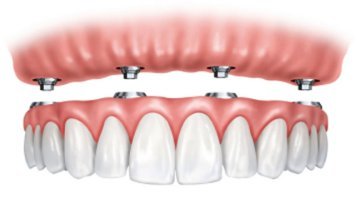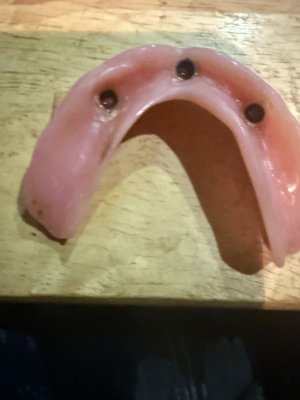Vicky
Member
- Location
- Pennsylvania, USA
As we age, most of us end up with some sort of dentures. The last dentist appt reminded me my upper tooth needs to be extracted. Because of my Tori on my roof of mouth; the only dentures that will serve me are dental implants. Because I have no dental ins, I will have to pay the $10,000 myself.
I have done a lot of reading on these dental implants, but of course they are sites that promote the procedure. They do not tell the whole story. From my understanding:
If you have these dental implants, can you answer some of my questions:
When I ask the dentist, he is vague with his answers. I personally do not know of anyone with implants to ask of their experiences, thus I ask this community.
1) Do food crumbs still get caught between denture and gums? Can you remove the implanted denture yourself?
I currently have partials, which are easily removed for cleaning, such as toast crumbs or poppy seeds get jammed between the gum and dentures. Currently, I am able to remove my partials to remove the food particles. I like this clean feeling as well, after my morning and night brushings. I am wondering will this be the same with dental implants.
2) After teeth are removed from the mouth, the bone shrinks over the years. Did you have to get new implants or new dentures periodically, even though you have implants?
3) If I am able to remove the denture; will the screw in the bone become lose over time?
My thoughts: Prying a denture on and off seems like the metal peg would loosen over time.
4) Are you able to bite into an apple with these implants?
When my front teeth were secure, I was able to bite into hard foods such as apple, carrot, etc. Now that my front tooth is so loose, I cannot do this anymore. Thus another reason I need to take action with my teeth.
5) After your teeth were pulled, how long did you wait until you got your dentures?
5) Why did you choose dental implants? Are you happy with your choice?
Telling me your experience (good or bad) will help me decide when to get the implant. This is a scary and costly and procedure for me.

I have done a lot of reading on these dental implants, but of course they are sites that promote the procedure. They do not tell the whole story. From my understanding:
- I will still have to have cleanings, which is the only time the dentures are removed from the implants. The fees for this are extremely more than regular cleaning. They now tell me my dentures will be inserted after my teeth are pulled and implants installed. A yr ago, a different dentist said there is a healing period of 6 months.
If you have these dental implants, can you answer some of my questions:
When I ask the dentist, he is vague with his answers. I personally do not know of anyone with implants to ask of their experiences, thus I ask this community.
1) Do food crumbs still get caught between denture and gums? Can you remove the implanted denture yourself?
I currently have partials, which are easily removed for cleaning, such as toast crumbs or poppy seeds get jammed between the gum and dentures. Currently, I am able to remove my partials to remove the food particles. I like this clean feeling as well, after my morning and night brushings. I am wondering will this be the same with dental implants.
2) After teeth are removed from the mouth, the bone shrinks over the years. Did you have to get new implants or new dentures periodically, even though you have implants?
3) If I am able to remove the denture; will the screw in the bone become lose over time?
My thoughts: Prying a denture on and off seems like the metal peg would loosen over time.
4) Are you able to bite into an apple with these implants?
When my front teeth were secure, I was able to bite into hard foods such as apple, carrot, etc. Now that my front tooth is so loose, I cannot do this anymore. Thus another reason I need to take action with my teeth.
5) After your teeth were pulled, how long did you wait until you got your dentures?
5) Why did you choose dental implants? Are you happy with your choice?
Telling me your experience (good or bad) will help me decide when to get the implant. This is a scary and costly and procedure for me.



